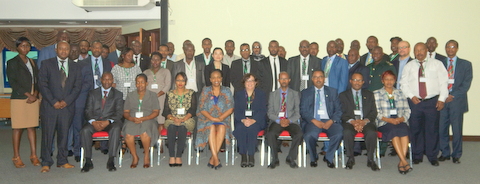
17-12-2015 (Uganda) – The Inter Governmental Authority on Development (IGAD) Security Sector Program (ISSP) and Global Counter-Terrorism (GCTF) are holding a regional workshop to look into ways that the IGAD Member States including Tanzania can work together to criminalize terrorism financing as well as learn, share and adopt best practices as stipulated in the Rabat Memorandum.
The workshop discussions sought to address the challenges faced by chain institutions involved in AML/CTF. It also explored international anti-money laundering and countering terrorism legal regimes and initiatives; regional strategies, mechanisms for combating money laundering and financing terrorism; challenges faced by private financial institutions in implementing AML/CFT legal regimes, among many others the important role these institutions play in the transfer of funds, the financial institutions were urged to take the lead in the fight against terrorism.
The workshop was officially opened by the Director of IGAD Security Sector (ISSP) Commander Muluneh Abebe, who noted the importance of countering the financing of terrorism as key in the fight against terror.
Commander Abebe urged enhanced collaboration, harmonization of laws and exchange of information between the IGAD Member States to eradicate mutual threat of terrorist financing. Through these powers, he observed, countries will in turn expand the discretionary power of law enforcement to respond to political activity as crime and be able to provide a mechanism through which governments can financially cripple individuals, charities, welfare and social justice organizations.
The workshop brought together a team of experts from various fields such as; financial forensics, international law prosecution, financial regulatory institutions, law enforcement agencies and counter transnational organized crimes.
Ms. Min Hee Kim, a Financial Forensic Expert from the US told the workshop that providing access to finance and sustainable projects as alternatives to the youth and monitoring of finances between individuals and organisations hence requiring a broader approach in interventionist programmes.
The team sought ways through which the capacities of the IGAD Member States can be enhanced to prosecute and apply criminal sanctions against terrorism financing as well as to obligate states to criminalize the financing of terrorism, terrorist acts and terrorist organizations and to designate terror-related offenses.
The Member States were called to put measures in place to detect the physical cross-border transportation of currency and bearer negotiable instruments, including declaration system or closure requirement. They clearly noted that human trafficking and corruption are sources of financing terrorist activities. They law makers and judiciary were urged to put in place more stringent penalties and sanctions against those that make false declaration, including the freezing and seizure of terrorist funds.
Mr. Charles Richard Kaamuli the Acting Chief Prosecutor under the Directorate of Public Prosecution for the Government of Uganda observed that terrorism and funding cannot be separated because by cutting the funds and the banking institutions being more vigilant with better training and technology; terrorist activities can be countered.
The Regional Financial integrity Center (RFIC); an institution under the European Union based in the Kenya School of Monetary Studies (KSMS) that provides professional training in AML/CFT to foster integrity in the IGAD region and Yemen was one of the facilitators at the workshop.
Also explored were the challenges posed by and opportunities to be drawn from the emergent mobile money systems. The workshop ultimately intends to collate from the various experiences of the participants in their various countries and formulate good practices for countering financing of terrorism ###